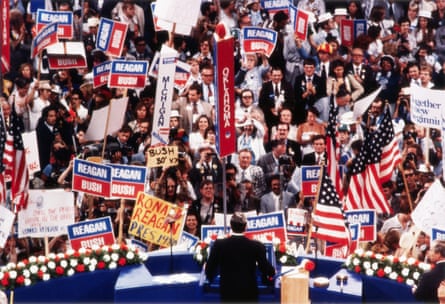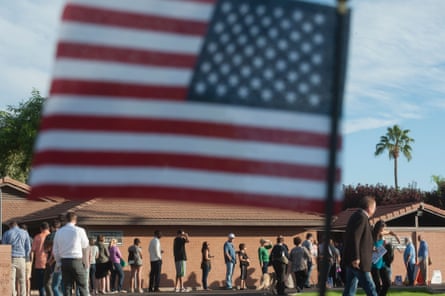“Warning” the posters stated in big red letters. “This area is being patrolled by the National Ballot Security Task Force. It is a crime to falsify a ballot.”
There was no such task force in existence – it was the fictionalised creation of the Republican National Committee (RNC). Top conservative strategists built it from scratch, inventing a private vigilante squad of 200 off-duty police officers and private security guards. They carried visible firearms, wore armbands bearing the name of the “Task Force”, and were equipped with official-looking walkie-talkies.
The year was 1981, and a bitter race for the New Jersey governor’s seat was approaching. Republican organizers publicly claimed their plan would combat widespread Democratic cheating at the polls. In fact, they had a more sinister intention: suppress the vote in Democratic strongholds where African American and Latino voters were in the majority and the election might be tilted in favor of Republican Tom Kean.
So up went the posters in New Jersey’s majority-Black inner city precincts. As Rutgers University historian Mark Krasovic recorded, Black voters waiting in line were asked for their registration cards by the “officers”, then turned away. Some Latino voters were chased from the polling stations by the daunting patrolmen. Kean won the election by all of 1,800 votes.
The 1981 “Task Force” amounted to one of the most egregious examples of election intimidation in America’s long history of voter suppression, but had a positive outcome. In the wake of those chilling events, the RNC was sued by the national and state Democratic parties. The case was settled out of court in 1982 at which point the RNC agreed to what was known as a consent decree.
Under its terms, the national Republican party pledged to abstain from poll watching unless it had obtained prior court approval. Party officials who broke that stipulation could be hauled before a federal judge and held in contempt.
For decades, the RNC was careful to avoid association with any measures that could be construed as intimidatory and to eschew coordination over poll watching with presidential campaigns, including Trump’s in 2016. But in 2018, the legal restrictions were lifted after the RNC persuaded a federal judge that it could be trusted not to return to the dark days of New Jersey in 1981.
Now the real test of what the RNC is capable of doing, freed of legal shackles, will come in November. And last week, Trump gave forewarning of what that might entail.
Asked by Sean Hannity on Fox News whether he planned to send in poll watchers to monitor voting and “avoid fraud”, Trump replied: “We are going to have everything. We are going to have sheriffs, we are going to have law enforcement and we are going to have hopefully US attorneys.”
The new task force
The 2020 presidential election will be the first time since Ronald Reagan’s landslide victory against Jimmy Carter in 1980 that the RNC will be able to unleash “ballot security operations” on election day entirely untrammeled. And the party will be allowed to freely coordinate with Donald Trump’s re-election campaign.

Trump’s threat last week – coming so soon after his actual deployment of federal agents to police protesters on the streets of Portland – was his most aggressive one yet, with the caveat that he has no power over local law enforcement and could be challenged in the courts.
But his tone matches the remarks of top RNC strategists who have bragged that they are preparing an army of 50,000 poll watchers to be posted at polling places on 3 November across 15 key swing states. The volunteer monitors will have the power in some states to pull people out of line and challenge their eligibility. In other states, they will be able to watch over the counting of mail-in ballots, and issue similar challenges.
The RNC also plans to train hundreds of lawyers ahead of November. They will have access to a $20m legal fund and will fan out across battleground states in expectation of fierce legal wrangling that could drag on well beyond election day raising spurious fraud allegations or claiming irregularities in mail-in voting.
The official line coming out of the RNC and Trump campaign is that it is only fair that they should be able to patrol polling places on an equal footing with Democrats. They insist that their only desire is to ensure election integrity by rooting out cheating.
“Now that the playing field has been leveled, we can do what Democrats and other Republican groups have been able to do for decades,” the RNC’s spokesperson Mandi Merritt told the Guardian.
She insisted that the party’s goal was to get more people to vote, not fewer. “We will ensure that all votes are counted properly, and that more people can vote through our field program. This is about getting more people to vote, certainly not less.”
The Trump campaign struck a similar note, accusing Democrats of being the ones to undermine the election. “Republicans will be ready to make sure the polls are being run correctly, securely and transparently as we work to deliver the free and fair election Americans deserve,” a senior campaign official said.
But voting rights experts are concerned. Kenneth Mayer, professor of political science at the University of Wisconsin-Madison, said that the lifting of legal restrictions on the RNC once again raises the prospect of trouble at the polls.
“This raises the potential that we could see a repeat of classic intimidatory tactics of past years – police cars outside polling stations, billboards warning of the penalties for vote fraud posted in Black or Latino neighborhoods. It may not happen, but you can see how it could get really nasty, and that’s deeply worrisome.”
Privately, top Republican officials view the end of the consent decree as a chance to get back into the game in a big way. Justin Clark, a senior lawyer in the Trump re-election campaign, told a panel on “defeating the left’s voter fraud machine” at the Conservative Political Action Conference in February that the ambition was to mobilise tens of thousands of poll watchers.
“For 40 years the RNC has been fighting this battle with one hand tied behind its back,” he said. “We are going to have scale this year, protecting our votes and our voters, making sure folks who are eligible to vote are able to do so – once.”
What he did not share with his audience is that voter fraud in the US is exceptionally rare. The Brennan Center, a nonpartisan law and policy organization, has reviewed the research and concluded the whole idea of widespread cheating is a myth, including through mail-in ballots.
Outside conservative groups are also floating ambitious plans ahead of November. True the Vote, a prominent advocate of the need for “ballot security” measures that others denounce as intimidation, has been telling its supporters that it will stage a November exercise that echoes the 1981 use of armed off-duty police in New Jersey.
The Intercept revealed earlier this year that the Houston-based group wants to recruit military veterans and retired police officers as poll watchers in November. (True the Vote did not respond to questions from the Guardian.)
Trivial threats?

It is a striking quirk of history that Kean’s 1981 campaign for New Jersey governor, which led to the consent decree, was managed by Roger Stone, the political dirty trickster and long-time Trump friend. Last month the US president commuted Stone’s sentence for obstructing a congressional inquiry into collusion between the 2016 Trump campaign and Russia.
In 2016, Stone concocted his own poll watching bonanza. He came up with an operation called Stop the Steal to send 3,000 poll monitors nationwide. He argued that the initiative was essential to prevent the presidential election being “rigged” – identical to Trump’s repeated and misleading assertions that the 2020 election is rife with fraud.
In the end, Stone’s widely-publicised threat to deploy hundreds of poll watchers in 2016 never came to pass. Stop the Steal turned out, like a lot of the Roger Stone playbook, to be so much hot air. And this month Stone told the Guardian he had no intention to repeat the effort. “I have no plans to do anything of this kind in November,” he said.
That was not the first time that ambitious plans for poll watching transpired to be more bluster and braggadocio than reality. In 2004, the Ohio Republican party – which, being a state institution, was not covered by the consent decree hanging over the national party – vowed to deploy thousands of poll watchers on election day in mainly Black precincts. Legal action duly ensued, rising all the way to the US supreme court which allowed the operation to go ahead. But it never happened.
Such false alarms raise questions about this year’s presidential cycle. Will the RNC’s talk of amassing 50,000 poll watchers on 3 November similarly turn into a puff of smoke?
Justin Levitt, a former top official at the civil rights division of the US justice department who now specializes in democracy law at Loyola Law School, suspects that it might. He points out that chest-thumping about putting tens of thousands of boots on the ground makes good fundraising material in an election year.
“You brag about the size of the operation even when it may in reality be considerably smaller,” he said. “It turns out that placing poll watchers across the country takes real logistics and organization. It’s not trivial – and in a pandemic it’s going to be even more difficult to achieve.”
A fog of misinformation
Whether or not it is effective, the RNC’s rhetoric about sending armies of poll watchers to polling places on 3 November is designed to sow seeds of doubt in voters’ minds about the integrity and safety of the electoral process.
Meanwhile, Trump has consistently attempted to undermine confidence in November’s poll, conjuring up a fog of confusion and misinformation. He has implied he may not recognize the result of the vote – at a time when he is trailing behind Democratic rival Joe Biden – and proposed delaying the ballot because of Covid.
Most recently, the president has openly admitted that he is undermining the US post office as a way of hampering mail-in voting, which he claims untruthfully is vulnerable to cheating.

But damage can be done even before election day comes around. The mere call for voters to be challenged at the polls to combat rampant fraud contributes to public doubts about the fairness of the election that Trump has avidly been pushing.
“If you talk about off-duty police officers in polling places, about problems at the polls in Democratic areas, that could deter turnout,” said Rick Hasen, a legal scholar who writes the Election Law Blog.
Mayer agreed. He interprets the RNC’s talk about getting back in the poll-watching game in order to combat fraud as “an obvious intentional effort to undermine confidence in the election”.
“One of the effects of that could be that people simply don’t vote.”
